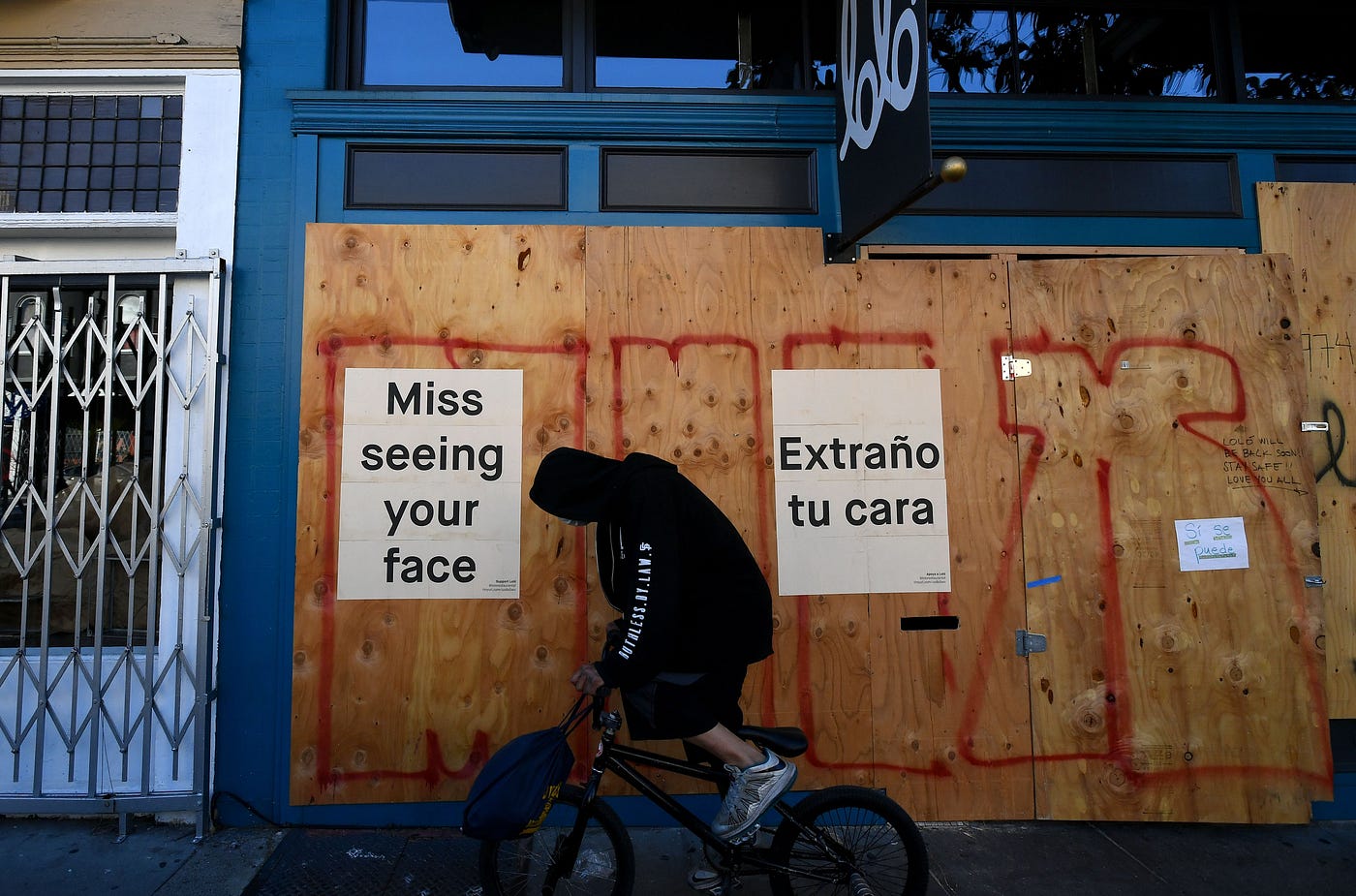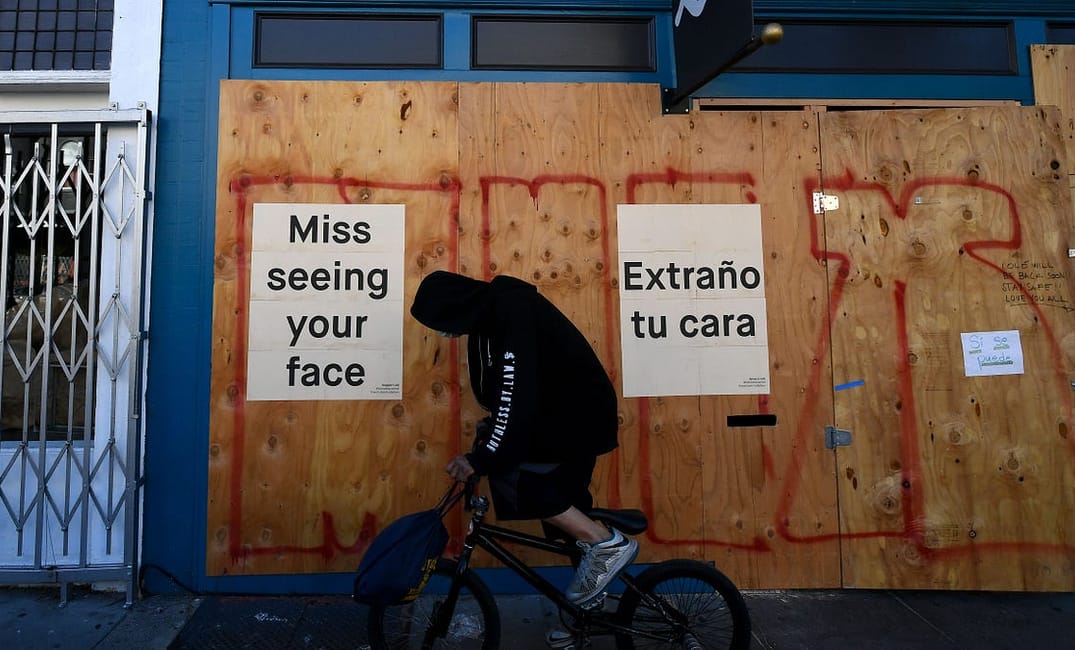
If you type “what will life look like” into Google, the first auto-fill suggestion is “after pandemic.” If you follow through with that search, you’ll find around 800,000,000 results.
We’ve got about six months of the virus behind us, and we’re left wondering what the world will be when this is all over. We don’t just want statistics and regulations anymore. We want reopening dates, housing predictions, and job forecasts. We want to know when we’ll travel again, when movie theaters will open up, when we can leave the house without a mask. We want to make plans for the future without feeling like they should have an insurance policy.
I’ve done my fair share of searching, too.
What will happen to San Francisco’s rent prices?
How will public transportation adapt?
What restaurants will be left?
But every time I bring up an article on “how the world will change,” the conversations, the op-eds, and the experts land on the same note: We can’t say for sure. We have ideas — that it’ll be a while before anyone feels comfortable at concerts, that traffic will increase as the popularity of public transportation falters — but we don’t have answers.
Sign-up for The Bold Italic newsletter to get the best content about life in the Bay Area in your inbox every week.
Even so, I keep at it, Googling worn-out questions for the sake of answers that end in question marks themselves. Why?
I’ve always been a “what if” type of person, finding comfort in the worst-case scenarios for the sake of preparation. At the start of shelter-in-place, I set up Google alerts, subscribed to coronavirus newsletters, and became the self-proclaimed informant for my family, whether they liked it or not.
Months later, I still feel my heart beat faster at the sight of sharp angles on unemployment graphs and red clusters on data charts for the state of Georgia, where my family lives.
But it isn’t the data about the past few months that keeps me refreshing my news feed. It’s a craving for certainty — not just in the days to come, but the months.
I always attributed my unhealthy relationship with the news app to my longtime loyalty to “what ifs.” But looking around a jaded, 80-degree San Francisco, I realized I wasn’t alone. Seeing everyone else ask the same questions, I was curious how we all ended up here, together.
On a basic level, many of our questions about the future come out of need. We need to know when the tax deadline is, how to face an election year in a pandemic, and what the regulations are going to be in our local areas. But it’s a thin line between practical consumption and obsession over the unknown.
The spiral left me searching for certainty again, but this time, the craving sent me in a different direction.
Studies show that uncertainty leads to increased anxiety (found during another Google search). “The unknown changes, those are really terrifying for people, and the majority of people have that fear. And it comes back to control. If I can’t control something, then I don’t know if I’m safe or not,” says Linnea Butler, a licensed therapist at Bay Area Mental Health with a core expertise in trauma therapy:
If you could put an end date on it, then it’s like okay, I need to hunker down and figure out how to deal with this. But that’s not what’s happening. That’s why the staged openings and the idea of “well, we’ll open it but maybe there’ll be a second wave” is extremely distressing for people.
Though it’s comforting to know that our desire for certainty is natural and valid, it’s also not enough.
In recent months, I’ve felt like I’m living out a half-life. Without the people and places that I usually remember my days by, I’ve felt untethered. There are jokes on the internet suggesting that these months shouldn’t count toward our overall age. Promises to “re-celebrate” birthdays when this is all over.
Of course, there’s nothing wrong with the hope that is post-quarantine plans. Our half-life sentiments are often grounded in hard truths, too — in the pushback of start dates, in financial uncertainty, in the demands of childcare.
But fixating on it too much reinforces the idea that we’re treading water rather than living a full life. To cope, Butler recommends accepting the situation and focusing on the day-to-day.
“You can’t do anything with a life circumstance until you accept it,” she says. “If I begin to accept it, I can say, ‘You know what, that’s where we are right now. And I have to deal with my life on a day-to-day basis.’”
I’m trying to take her advice. I’m still subscribed to coronavirus newsletters, I’d love to re-celebrate my friends’ birthdays later, and I’ll probably never let go of “what if” as a staple in my vocabulary (if only for the sake of nostalgia). But recognizing that my drive for certainty is as natural as it is hollow helps me identify and pause the spirals.
I still Google the practicalities — the policies and the case data. But I’ve let go of the guesswork. Instead, I’ve started holding myself to media breaks, stepping away when I realize I’m a few links away from where I started.
I realize that my “what ifs” are attempts to avoid risk, to avoid failure, to avoid surprises. But where we are now, “what if” is bottomless. I don’t know whether I’ll carry a backup mask in my bag six months from now, or if my favorite restaurant will last through the year. But I’ve accepted that no one else can say for sure, either. Googling won’t change that; it’ll just give me whiplash.
We might have a long way to go. But we can go easy on ourselves in the process.
Editor’s note: If you or someone you know is struggling with mental health, contact a trained mental health professional for help. For serious circumstances of life-threatening depression, please contact the National Suicide Prevention Lifeline (800–273–8255).







